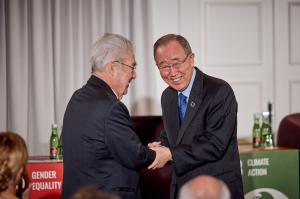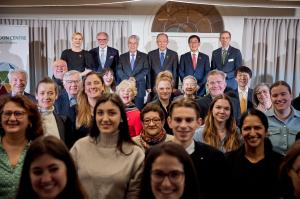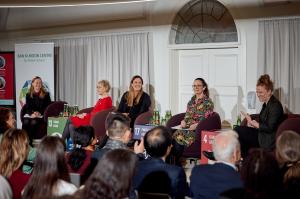
Ban Ki-moon and Heinz Fischer Inspire Call to Action at International Forum on Education and Climate in Austria
The International Forum on Education and Climate brought together over 120 thought leaders, policymakers, experts, and students worldwide in Salzburg, Austria.
VIENNA, AUSTRIA, December 20, 2024 /EINPresswire.com/ -- Bringing together stakeholders from diverse fields to address the intersection of education and climate action, the International Forum on Education and Climate was a unique event held on 13 December 2024 at Schloss Leopoldskron in Salzburg, Austria. The Forum was jointly hosted by the Foreign Ministry of the Republic of Korea, the Ban Ki-moon Centre for Global Citizens (BKMC), and Salzburg Global.Building on the success of the previous year’s International Forum on Global Citizenship Education, this year’s Forum focused on advancing the Sustainable Development Goals (SDGs) of Quality Education (SDG 4) and Climate Action (SDG 13), with an emphasis on empowering youth and educators as agents of change.
More than 120 participants attended in person, including climate education experts, policymakers, young changemakers, educators, academics, and representatives from NGOs and international organizations from South Africa, Nigeria, the United Kingdom, Finland, Mexico, Sweden, Canada, Hungary, Bulgaria, Slovenia, Turkey, Switzerland, France, China, the Republic of Korea, Montenegro, Italy, and Austria.
The Forum aimed to promote climate literacy by integrating climate education into global curricula, empower educators with the knowledge and tools to effectively teach climate-related topics, foster global collaboration among educational institutions, governments, and NGOs, and develop actionable strategies for incorporating climate education in both formal and non-formal settings.
Moderated by BKMC CEO Monika Froehler, the event began with opening remarks from high-level representatives, including Dr. Heinz Fischer, 11th President of the Republic of Austria and BKMC Co-chair, H.E. Ham Sang Wook, Permanent Representative of the Republic of Korea in Vienna, and Benjamin Glahn, Deputy CEO of Salzburg Global. A video message from Irina Bokova, former Director-General of UNESCO, added further significance to the opening.
In his opening remarks Dr. Heinz Fischer highlighted the importance of such forums: “The subject of this Forum is education and environment. There are good arguments to say these are very crucial topics. We need climate action to survive, and education to be better qualified and to be able to tackle the problems of today.”
A key highlight during the event was the keynote address by H.E. Ban Ki-moon, 8th Secretary-General of the United Nations and BKMC Co-chair, on the urgent need for the global integration of climate education to build a sustainable future:
“You and I have a moral responsibility as educators, business leaders, or as social leaders to make sure that these Sustainable Development Goals are implemented. So let us teach and educate our younger generation to be global citizens who act with passion and compassion.”
The Forum featured experts, youth, and educators across three panel discussions focusing on the importance of climate education. The first panel examined the role of educators as climate leaders, discussing the professional development needed to empower teachers to integrate climate education across all subjects. Moderated by Stephanie Godec, Department of Education & Coordinator Austrian UNESCO Schools, Austrian Commission for UNESCO, the panel featured Katrin Kohl, UNESCO Chair in Reorienting Education towards Sustainability, University of York, focal point for the Higher Education and Research for Sustainable Development Global Cluster; Patricia Vazquez, CEO, Mexicanos Primero, former Minister of Public Education in the State of Puebla, Mexico; Ingrid Pramling Samuelsson, Professor in Early Childhood Education, UNESCO Chair in Early Childhood Education and Sustainable Development, University of Gothenburg; Kati Anttalainen, Senior Ministerial Adviser in the International Relations Secretariat, Ministry of Education and Culture, Finland Speakers emphasized collaboration, the need for bottom-up approaches, and the importance of giving teachers the autonomy to innovate.
Representing the education sector, Katrin Kohl reiterated how we can empower teachers in uncertain times: “To empower teachers we need to equip them with skills to deal with and cope with the uncertainty that they find themselves in as people, and in their position with the inability of knowing what's ahead for their students. Safe spaces are going to be crucial if we want schools to move forward in meaningfully embedding climate discussions (...).”
The second panel focused on successful global case studies for embedding climate education into formal curricula. Moderated by Joysy John, Edtech Advisor, Consultant and Speaker, the panel featured Lim Hyun Mook, Director, UNESCO APCEIU; Kate Greer, Senior Research Fellow, Centre for Climate Change and Sustainability Education, University College London; Charles Hopkins, UNESCO Chair in Reorienting Teacher Education, York University; Pengfei Jiang, Academic Principal, SDGs Curriculum Office, Zhuji Ronghuai Foreign Language School. The panel highlighted the need for a holistic, interdisciplinary approach that integrates climate education across various disciplines and ensures accessibility for all students.
The third panel discussed the importance of community engagement and non-formal education in promoting climate literacy. It highlighted successful grassroots initiatives and emphasized youth empowerment, as well as the need for political reform and systemic change to complement educational efforts. Speakers included Lilitha Buti, Weaver, YouthXYouth, Salzburg Global Fellow; Jack Davies, World’s Largest Lesson; Matthias Strolz, Impact Entrepreneur, Capacity Builder, Author, and Party Founder; Olivier Brechard, Director of International Relations, Learning Planet Institute and Dominic Regester, Director of Education, Salzburg Global.
Representing youth in the Global South, Lilitha Buti emphasized that climate impacts exacerbate long-standing inequalities: “Climate change affects us all, but it is not affecting all of us in the same way. We cannot talk about climate change without speaking about historical injustice.”
During the closing ceremony, Matthias Strolz, former Politician and Impact Entrepreneur, delivered an inspiring session, where he urged participants to balance knowledge with compassion. Several audience members engaged in the conversation and raised questions about the topic.
Finally, Austrian Actor and Director and Sustainability Advocate Cornelius Obonya closed the Forum by calling for greater recognition of arts and culture as a dedicated Sustainable Development Goal (SDG) and the need for intergenerational collaboration.
The International Forum on Education and Climate served as a significant milestone in advancing climate education. By fostering dialogue, collaboration, and actionable strategies, it has paved the way for transformative initiatives that empower educators and youth to lead the fight against climate change. The BKMC and its partners remain committed to making progress in this critical area.
Watch the recording here: https://www.youtube.com/watch?v=2vi2brhb6GI
Check out our pictures: https://flic.kr/s/aHBqjBVhmK
Katharina Choe
Ban Ki-moon Centre for Global Citizens
+43 664 9163287
email us here
Visit us on social media:
Facebook
X
LinkedIn
Instagram
YouTube
Watch back: International Forum on Education and Climate
Distribution channels: Education, Environment, Human Rights, International Organizations, Politics
Legal Disclaimer:
EIN Presswire provides this news content "as is" without warranty of any kind. We do not accept any responsibility or liability for the accuracy, content, images, videos, licenses, completeness, legality, or reliability of the information contained in this article. If you have any complaints or copyright issues related to this article, kindly contact the author above.
Submit your press release


